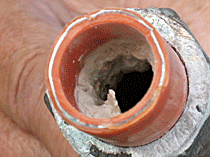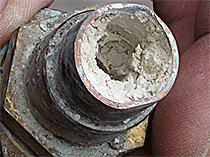What is Kitec Plumbing?
Kitec is the name given to a brand of plumbing system that utilizes brass fittings known as yellow brass. Kitec yellow brass fittings use alloys containing more than 15 percent zinc.
The pipes used in Kitec plumbing are constructed of a thin layer of aluminum that is sandwiched between an inner and outer layer of plastic polymer.

Kitec plumbing was installed in many homes between 1995 and 2007. Kitec was often used because of its low cost and ease of installation in comparison to copper piping.
However, as early as 2005, Kitec plumbing was being recalled due to the high failure rate of the brass fittings. This was due to issues with dezincification that causes residue buildup inside the pipes.
Why Does Kitec Plumbing Fail?
There have been several explanations for why Kitec plumbing tends to fail over time.
The most widely accepted reason for Kitec's high failure rate is dezincification. This occurs when fittings with a high zinc content are exposed to oxygen and moisture.

As dezincification progresses, the fittings leach zinc into the pipes. This forms zinc oxide—a white, chalky residue that can restrict water flow, lower water pressure, and lead to pipe leaks.
The rate of dezincification varies across the country, depending on local water chemistry. We've often replaced Kitec systems that failed in less than 10 years due to leaks and reduced water flow.
How Do I Know If I Have Kitec Plumbing in My Home?
The most reliable way to check if you have Kitec plumbing is to look at the pipes connected to your water heater, under sinks, or in areas like basements or utility closets.
Kitec pipes are typically bright orange (used for hot water) and blue (used for cold water), and may be stamped with brand names such as "Kitec," "KTC," "IPEX". The fittings are usually made of yellow brass, which may appear dull or corroded over time.
If you're unsure, one of our local Repipe Consultants can inspect your system and confirm whether your Kitec plumbing is showing signs of failure.
Is There a Class Action Lawsuit Against Kitec Plumbing?
In 2012, IPEX Inc., the manufacturer of Kitec plumbing, agreed to a $125 million class action lawsuit settlement. This allowed many homeowners in the U.S. and Canada to receive compensation toward replacing their Kitec plumbing.
However, the deadline to submit a claim expired on January 9, 2020. If you still have Kitec plumbing, you'll need to cover the cost of replacement yourself.
There have also been a number of claims made against other types of yellow brass fittings. Many of these cases (such as those brought in Washington) have been successfully defended.
Manufacturers of yellow brass fittings argued that there was nothing inherently wrong with the fittings themselves, particularly the idea that zinc content alone caused failures. They were able to demonstrate that the failures were due to water chemistry, not the fittings.
ASTM (American Society for Testing and Materials) specifications allow brass fittings to contain up to 37 percent zinc, well above the 15 percent commonly found in yellow brass. This makes it difficult to mount a legal case based solely on zinc levels.
In summary, you can no longer file a claim under the expired Kitec settlement, and it's unlikely that new litigation will emerge. If your home still has yellow brass fittings, you'll be responsible for the cost of a full repipe.
What Are My Options For Replacing Kitec?
PEX (cross linked polyethylene) tubing or copper piping are the main options for replacing Kitec plumbing. The majority of our customers choose a PEX repipe. Read more about why we believe PEX pipes are the best choice for repiping.
Here at Repipe Specialists, our repipes come with a lifetime warranty, so you no longer have to worry about paying for multiple leak repairs.
A whole-home repipe may be less disruptive than you think: we typically complete a repipe in one day and return another day to patch walls.
We always have your water back on by the end of the day. For more information, read about our One Stop Repipe™ Process, perfected over thirty years and tens of thousands of repipes.
What Is the Cost to Replace Kitec?
The cost to replace Kitec plumbing can vary depending on the size and layout of your home.
Most of our repipes range between $4,500 for smaller homes and up to $15,000 for larger, more complex projects. For a deeper look at what affects repipe pricing, read our guide: How Much Should a Repipe Cost?
To help ease the burden of an unexpected plumbing expense, we also offer repipe financing options with no money down and no interest.
Get your free estimate today
With over 75,000 repipes completed, we've perfected our One-Stop Repipe™ for your home.
Get a Quote to Replace Your Kitec Pipes
Here at Repipe Specialists, we've fully replaced the plumbing in over 75,000 homes across the United States, using both copper piping and PEX tubing. Many of these projects involved removing failing Kitec systems. We regularly receive positive feedback from customers about their overall repipe experience, while often exceeding their expectations when it comes to:
- Speed: Our repipe crews typically complete a repipe in a day, returning on another day for wall patching.
- Convenience: Through our One-Stop Repipe™ process, we handle everything from permits, to wall patching, to inspections.
- Cleanliness: Our crews are trained to protect your home while working (we cover all surfaces with protective sheeting), and to clean up fully at the end of each day.
- Peace of Mind: Repipe Specialists is a fully licensed plumber in every state we operate in, and we back all of our repipes with a lifetime warranty.
- Financing programs: To help take the sting out of unplanned repipe expenses, we offer several financing programs.
- Price: As a specialist that performs hundreds of repipes a week, we can deliver high-quality repipes at a lower cost vs generalist plumbers. We have an article that covers repipe cost factors in detail.
Schedule a free in-home consult, and one of our local repipe consultants will explain all your repipe options and provide you with a written, fixed-price quote.

